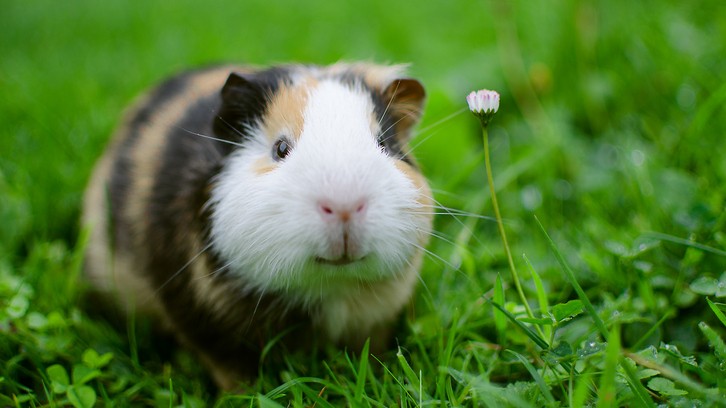How long do guinea pigs live? Your top six guinea pig questions answered
How long do guinea pigs live? Let’s find out and answer other guinea pig questions you’ve been asking

How long do guinea pigs live? What should I feed my guinea pig, and what kind of enclosure should my guinea pig live in?
If you have ever considered adding a guinea pig to your family, you’ve probably asked these questions, along with many others. Before committing to one, take the time to learn more about these fun, furry companions to determine whether a guinea pig is the right pet for you.
1. How long do guinea pigs live, if cared for appropriately?
The average lifespan of a guinea pig ranges from five to seven years. Like humans, lifespan is affected by several factors, including genetics, diet, and environment. For example, guinea pigs that are not provided with adequate Vitamin C are prone to develop scurvy, which can be fatal even in young guinea pigs.
Therefore guinea pigs who are fed a nutritious diet will live longer, healthier lives. However, as guinea pigs reach four to five years of age, owners often notice that they begin 'slowing down', and health problems may start to develop.
2. What type of food, supplements, and treats should a guinea pig eat?
There are several components to a healthy diet for guinea pigs. First, guinea pigs require a grass-based, commercial diet specifically formulated to meet their nutritional needs. Next, guinea pigs need a Vitamin C supplement because their bodies cannot make their own. This can be provided as a water additive (which must be replaced every day) or in the form of vegetables that are high in Vitamin C.
Guinea pigs also need constant access to grass hay, which serves as a source of fiber that aids their digestion. Finally, guinea pigs should be offered a variety of vegetables, which provide both additional fiber and nutrients. Fruits can be offered occasionally as treats but should not be a daily component of a guinea pig’s diet due to their high sugar content.

3. What is the best housing option for a pet guinea pig?
Guinea pigs do best when housed in a quiet area, away from any hustle and bustle. Their enclosure should be in a location that is free from drafts and away from direct sunlight. Aquariums are not appropriate housing because they do not allow proper ventilation. Instead, an enclosure with open wire or plastic sides should be used. The enclosure should be approximately 30 x 36 inches for a single guinea pig, although the larger the enclosure, the better.
Grates or wire floors can lead to various skin and foot issues in guinea pigs. Therefore, it is best to provide an enclosure with a solid floor covered in soft bedding or shavings. Provide at least one small box or hide within the enclosure to ensure your guinea pig has a secure and safe place to rest.
4. Does my guinea pig need to see a vet for regular checkups?
Regular veterinary visits are an essential part of keeping your guinea pig healthy. Like dogs and cats, guinea pigs should see the veterinarian every six to 12 months for a routine check-up.
At this visit, the veterinarian will ask about things like housing and nutrition to ensure that a guinea pig is receiving the best possible care at home. The veterinarian will also perform a thorough physical exam, assessing overall body condition, teeth, eyes, and ears.
In addition to these routine wellness visits, guinea pigs should be taken to a vet any time they show signs of illness.

5. Should guinea pigs be kept alone or with other guinea pigs?
Guinea pigs are very social animals. For this reason, it is often best to have two guinea pigs if you have the space, time, and financial resources to do so. If you purchase your guinea pig from a breeder or pet store, you may be able to buy two guinea pigs that have been housed together since a young age. If you decide to add a second guinea pig later, it's important to introduce the two animals gradually and under close supervision to ensure that they get along.
Also, be sure that both animals are of the same sex so that you don’t find yourself with an entire litter of newborn guinea pigs to look after!
6. Is it true that guinea pigs can’t vomit?
You may have heard that guinea pigs cannot vomit. That’s true! Unlike dogs, cats, and humans, guinea pigs lack a vomiting reflex. Instead, guinea pigs are like rabbits and horses: they have a gastrointestinal tract that simply isn’t wired to move food upstream from the stomach to the mouth.
This has several implications. First, you can’t induce vomiting in a guinea pig that may have eaten something toxic. So, if you’re worried about something that your guinea pig ate, you should contact your veterinarian immediately. Guinea pigs are also prone to bloat and can occasionally get painful obstructions in their gut, made worse because they can't vomit.
It’s also worth mentioning that if a guinea pig does appear to be vomiting, it is likely doing something different. Some guinea pigs drop small amounts of chewed food if they have problems with their teeth. If you ever suspect that your guinea pig is unwell, you should contact your veterinarian.
Guinea pigs are unique pets
While guinea pigs are a relatively common pet often seen in pet stores and recommended for children, it's important to understand that these animals are not necessarily low maintenance! For a guinea pig to thrive, it is crucial to meet their nutritional, medical, and social requirements by providing appropriate care and being aware of the needs of these unique pets.
Thinking of getting a guinea pig? Here are the best guinea pig breeds to consider
PetsRadar Newsletter
Get the best advice, tips and top tech for your beloved Pets
Dr. Barnette is a graduate of the University of Florida, where she received both her B.S. in Zoology and her Doctor of Veterinary Medicine (DVM). She has 15 years of clinical experience as a small animal veterinarian, treating dogs, cats, and occasional exotic patients. She now works as a freelance veterinary writer, creating educational content for veterinarians, veterinary team members, and dedicated pet owners. Dr. Barnette lives in southwest Florida with her husband and daughter (plus two cats, a dog, and a rescued dove!) and enjoys kayaking, biking, and hiking. Learn more about Dr. Barnette at www.linkedin.com/in/catherinebarnette.

